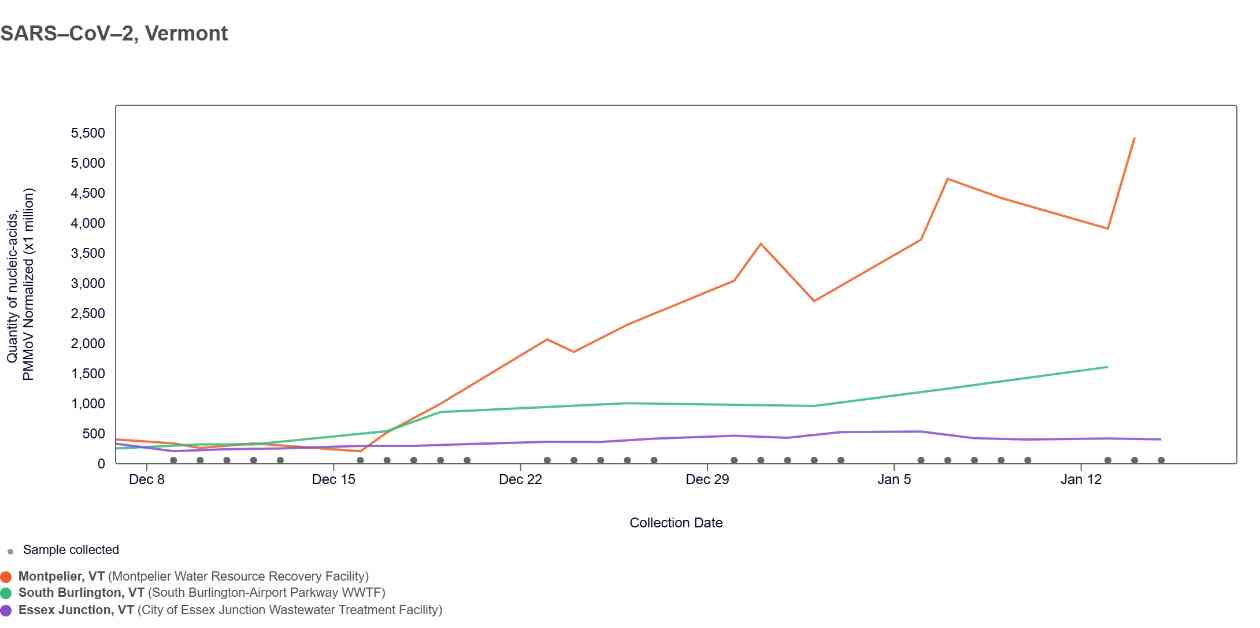**COVID-19 Update: Montpelier Bridge January Virus Report**
COVID-19 cases are on the rise in Montpelier, with levels of the virus in the city’s wastewater spiking to the mid-5000s since mid-December. This significant increase from around 200 during the recent autumn lull has raised concerns among health officials and residents alike. The data comes from WastewaterSCAN, a monitoring system that tracks virus levels in wastewater to provide early warnings of outbreaks.
The Spread and Risks of COVID-19
COVID-19 is known to spread through the air, much like cigarette smoke. Infected individuals can unknowingly transmit the virus through breathing or talking, even if they do not exhibit any symptoms. The virus can lead to a variety of health complications, including inflammation, clotting issues, and autoimmune responses.
To reduce the risk of contracting or spreading COVID-19, health experts recommend wearing N95 or KN95 respirator masks with no air leaks, especially in crowded places. Additionally, implementing brisk HEPA filtration and ensuring good ventilation can help minimize exposure to the virus. These preventive measures can also offer protection against other airborne viruses such as the flu and RSV, both of which are currently on the rise, as well as smoke, soot, and other air pollutants.
The Role of Vaccines and Updated Information
Updated COVID-19 vaccines are now available and can help reduce the risk of severe complications if an individual becomes infected. However, these vaccines may not provide strong protection against infection due to the evolving nature of the virus. Health officials continue to monitor the situation closely and provide updated guidance as needed to address the ongoing challenges posed by COVID-19.
The Emergence of Norovirus
In addition to COVID-19, Montpelier is also facing a surge in norovirus cases, with current wastewater levels surpassing those seen since March 2023. Norovirus, known for causing symptoms such as diarrhea and vomiting, spreads easily through contact with contaminated food, water, and surfaces. Unlike COVID-19, hand sanitizer is not effective against norovirus. The recommended method for preventing its spread is by thoroughly washing hands with soap and water for at least 20 seconds.
If exposed to norovirus, individuals should be vigilant for signs of dehydration and take appropriate measures to prevent further spread. Washing contaminated laundry in hot water and cleaning surfaces with a bleach solution can help reduce the risk of infection. For more information on norovirus prevention and treatment, visit the Centers for Disease Control and Prevention website at cdc.gov/norovirus.
**Personal Touch:**
As we navigate through these challenging times, it’s essential to prioritize our health and well-being. Remember to stay informed, follow recommended safety guidelines, and take proactive steps to protect yourself and those around you. By working together and supporting one another, we can overcome these obstacles and emerge stronger as a community. Stay safe and take care of yourselves!



















